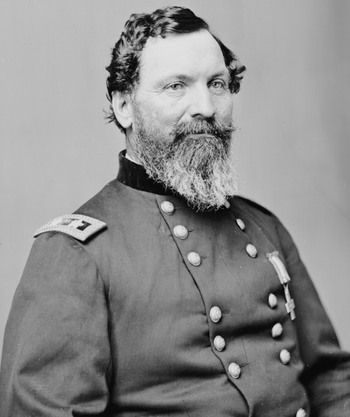 |
| Lee |
He believed the found a weakness in Lee's line, where several units remained north of the river, connected to the rest only by a pontoon bridge. Lee hoped that by holding this bridgehead he could threaten any movements that Meade might make. But Meade decided to strike it with the troops of John Sedgwick, while at the same time William French's men crossed the river several miles downstream.
The Battle of the Rappohannock began 150 years ago today on November 7, 1863. When Lee got word of the Federal movements he decided to have the force at Rappohannock Station try to hold out under Sedgwick's attacks, while the rest of the army focused on crushing French. There were 2,000 men in the division of Jubal Early which held the bridgehead, and they came under artillery fire around 3 pm. As the afternoon wore on with no sign of a further attack, the Confederate believed they were safe. But at dusk a blue line appeared heading towards them at the double quick. Before the Confederates could beat them back, the Yankees were over the entrenchments, fighting them hand-to-hand. Within minutes the Confederates had their lines overrun and their retreat cut off with the capture of the pontoon bridge. Some rebels tried to swim the cold river, but most lay down their arms, realizing further resistance was futile.
The Confederates lost nearly 17,000 men, 80% of those engaged. The Federals lost only 419. The Northerners were able to gain this quick and glorious victory because the Confederates had allowed themselves to be surprised in a position where their retreat could easily be cut off. That evening Walter Taylor, on Lee's staff, wrote that it was “the saddest chapter in the history of this army. … Miserable, miserable, miserable management.” With this defeat overturning his plans, Lee fell back, south of the Rapidan.






